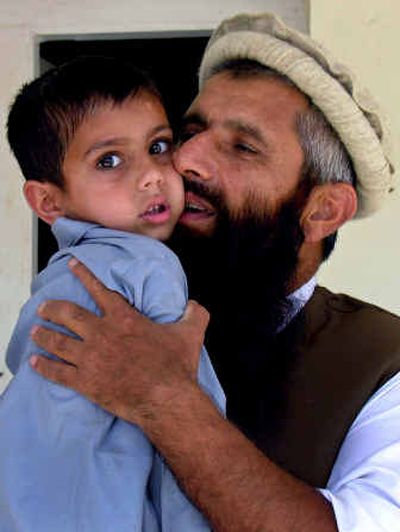Detainee: No torture, but solitary worse

PESHAWAR, Pakistan – An Afghan man freed from the U.S. detention center for terror suspects at Guantanamo Bay said Saturday he was stripped naked and photographed the day he arrived, but was not tortured during three years at the camp. He said his interrogators asked over and over: “Do you know Osama?”
Abdul Rahim Muslim Dost, 42, told the Associated Press that he and his brother were arrested at their home on Nov. 17, 2001, by Pakistani intelligence agents and eventually taken to the U.S. military facility at Bagram, north of the Afghan capital, Kabul. After about 11 weeks there, he was flown to Guantanamo.
“First I was questioned by Pakistani security men. Then American men and women also started to interrogate me. They had only one question: Do you know Osama?” Dost said, referring to al Qaeda leader Osama bin Laden.
“I told them that you have made Osama so popular that even children and mad people know him very well,” he said.
The same line of questioning continued at Guantanamo Bay, with American interrogators also asking him whether he had anything to do with Taliban leaders.
“I told them I had nothing to do with Osama or the Taliban,” Dost said from the home he shares with his wife and eight children in this frontier city. Relatives stopped by to send their congratulations, and his children scurried around him.
It was Dost’s first interview since he and 16 other Afghan men were set free in neighboring Afghanistan on Tuesday. The next day he traveled by road to this city in northwestern Pakistan, where he and his family have lived for the past 30 years.
Dost said before his arrest he had worked for three Afghan magazines – Ahsan (Justice), Zeray (Good News) and Dawat (Invitation) – which were all sympathetic to the Taliban. He said he had once been a member of Afghan rebel leader Gulbuddin Hekmatyar’s Hizb-e Islami party, but had severed ties to the group.
“I committed no crime against the Americans or anyone else,” Dost said.
Dost’s brother, Badrul Zaman Badr, who was freed from Guantanamo in December 2004, sat at his side as he recounted his experiences at the prison.
Dost said on the day he arrived his American jailers forced him to take off his clothes, then photographed him. After that he was taken to a doctor and then given an orange prison jump suit.
“I was never tortured,” Dost said. “But I was kept in solitary confinement and that was worse than torture.”
None of the other Afghans freed Tuesday has been interviewed. But one claimed during impromptu comments at a news conference held in Kabul to mark their release that he had been abused.
“There was a lot of bad treatment against us, but this is not the time to tell you,” Abdul Rahman said before being whisked away by Afghan security agents. “Everybody in the world knows what kind of jail it is. I can’t talk about it now.”
Dost said he had heard stories of sexual humiliation, including an American female guard who allegedly threw menstrual blood at an inmate, and male and female guards having sex in front of an Arab detainee.
Other former inmates have told stories with similar details.
But Dost and his brother said nothing like that happened to them.
After 14 months of daily interrogation, Dost says he was moved to a cage alongside other inmates who were no longer wanted for questioning.
Finally he was taken to a courtroom at the prison where three people “who looked like judges” briefly heard his case. A few weeks later he was freed without an apology.
The releases lowered the number of detainees classified as “enemy combatants” at the U.S. Navy base on the tip of Cuba to about 520 from about 40 countries.
Dost said he was considering filing a lawsuit to seek compensation for his years behind bars, and that he was thinking of writing a book.
“My business suffered because of my arrest, and my family suffered as well to have two members taken there. My mother is so depressed that she still thinks one day the Americans will come and arrest us again.”